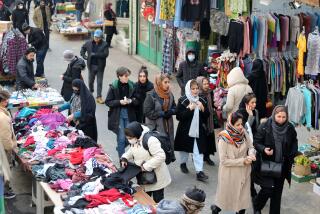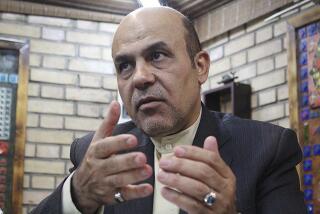Iran’s Bunker Mentality Slams an Open Window
- Share via
Three years ago Iran--hard pressed by economic problems, a stalemated war and diplomatic isolation--energetically began to cultivate better relations with Western Europe, the Arab states of the Persian Gulf and the Soviet Union.
Although opposed by hard-liners in Tehran, this “open window” policy--as it came to be called--appeared to yield rich dividends. Iran’s preference for a policy of lower oil production and higher prices finally prevailed in the Organization of Petroleum Exporting Countries. France, one of the courted European states, agreed to start repaying an Iranian loan and accrued interest of more than $1 billion. It also expelled a leading Iranian opposition group from Paris.
Encouraged by signs of “moderation” on Iran’s part, as we now know, the United States provided the Islamic republic with substantial quantities of arms in 1985 and 1986. Through Lt. Col. Oliver L. North’s associates, Richard V. Secord and Albert Hakim, the United States as recently as last November was promising Iran assistance in getting rid of Iraqi President Saddam Hussein and in securing the release of Shia Muslim political prisoners in Kuwait.
In all this Iran could trade on its undoubted strategic and regional importance, its economic weight and its influence with hostage-takers in Lebanon. France, for example, made no secret of wanting a share of Iran’s lucrative import market, and it also wanted Iranian help in freeing its hostages in Lebanon. Indeed, five French hostages were freed between June and December, 1986.
But for Iran the open-window foreign policy involved a delicate balancing act.
Lebanon is a case in point. Iran has used its revolutionary credentials, financial incentives and links with Lebanon’s Shia clerics to develop considerable influence with Shia militants who operate under the umbrella of Hezbollah, or Party of God. Lebanon, the Iranians said, would become the Middle East’s second Islamic state.
But, like the United States, France learned that Iran does not fully control the hostage-takers in Lebanon. Fewer French hostages were released than had been promised.
The Iranian government has not always been able to control its radicals at home, either. When the story of the Iran arms sale first broke, the Ayatollah Ruhollah Khomeini himself had to step in to silence the critics of buying weapons from America. The government is still being pressed to come out with the full story of its dealings with the Great Satan.
The open-window policy, moreover, is contingent on the ability to show results, and recently Iran has suffered a series of foreign-policy setbacks. Diplomatic relations with France were broken earlier this month after French officials sought to question an Iranian embassy employee, Wahid Gordji, in connection with the terrorist bombings in Paris last September in which a dozen people lost their lives and scores were injured. Since the break, French diplomats in Iran have been accused of espionage and are virtual hostages in their own embassy in Tehran.
But France itself was never weaned away from the alliance with Iraq. American arms shipments have been discontinued. American re-registration of Kuwaiti ships has made it more difficult for Iran to attack a major Iraqi ally at its most vulnerable point. The war itself is at a standstill. The U.N. Security Council unanimously approved a cease-fire resolution that does not satisfy Iranian conditions.
These adverse developments appear to have strengthened the hand of hard-liners in Iran, revived Khomeini’s own misgivings about the open-window initiative and reenforced Iran’s barely suppressed bunker mentality.
Iran, however, cannot risk direct confrontation at sea with the United States. It therefore has set out to make life uncomfortable for America’s allies in the Persian Gulf--Kuwait and Saudi Arabia. This is behind Iran’s threat to retaliate against the economic assets of its Arab neighbors, and Khomeini’s call last week on Iranian pilgrims at Mecca to “disavow the infidels.” Khomeini could not have foreseen that the ensuing riots against the Saudi government would lead to the deaths of 400 pilgrims, more than half of them Iranian, but the casualties have led Iranian leaders to question once again the qualifications of the Saudi royal family to serve as the keepers of Islam’s holiest shrine--a highly emotive issue--and to predict their overthrow.
These are serious developments. Despite appearances, however, Iran’s room for maneuver is limited. It cannot afford total diplomatic isolation. The inclination to revive the open-window policy therefore remains considerable. But the deaths at Mecca, the heightened rhetoric in Tehran, the growing hostility expressed toward the West and the Arab states of the gulf, and Khomeini’s direct involvement in these developments make such a revival unlikely in the near future.
More to Read
Sign up for Essential California
The most important California stories and recommendations in your inbox every morning.
You may occasionally receive promotional content from the Los Angeles Times.










